#and that he got criticized for his support of catholics
Explore tagged Tumblr posts
Note
do you perchance know why almost EVERY willmack blog is convinced will smith is like a huge momma’s boy and that his family won’t leave him alone😭 I know his family comes to a lot of his games, but some blogs spin it in such an evil way
i'm back with another willmack lore drop/literature review/whatever you want to call it!

today's topic: will smith hockey's close-knit family!🧑🧑🧒🧒🩵
will's relationship with his family, and his home town of lexington, mass, is definitely an interesting one. both are clearly extremely important to him.
below is a post from the official battle of lexington ig account (yes that exists) detailing will and his family’s deep roots in lexington, as well as an excerpt from this article which shows how important will's heritage is to him and his family.
A third-generation Lexingtonian, Will’s family is deeply woven into the town’s fabric. He attended Hancock Preschool (like his dad, Bill, 40 years earlier) and Bowman Elementary, spending his childhood at @HaydenRecreation, skating on frozen ponds and backyard rinks.



as we know from cat's podcast - will's family attend the re-enactment of the battle of lexington every year! he thinks it's cool and is kind of history nerd. will is also at least the third 'william smith' in his family (following his father and grandfather) technically making him 'william smith III' ig? although his dad goes by 'bill'.
when will had to move to michigan for the usa development program, instead of billeting with a host family like most kids do, will's family bought a house in michigan for two years (whilst keeping their house in lexington ofc) because his dad felt it was 'important to be there at a critical stage of his life'
will had fellow massachusetts boys will vote (arlington) and ryan leonard (amherst) living with him! both wsh's and will vote's mom spent two-week shifts living with the boys and cooking/shopping for them. this basically meant that will's mom was able to cook for him and provide family support fairly regularly whilst he was playing his hockey, so she was very present in his journey! (momma's boy) in fact, will's mom said 'she feels like she has two more sons.'

will's dad was working back in boston often and grace was already attending bc! speaking of bc, will is the 14th member of his family to attend the school despite initially commiting to northeastern at the tender age of 14 (his friends from st. sebastian were commiting there too). and he luckily got to tell his grandfather before he died that he was committing to bc.
will regularly met up with his sister, grace, in his freshman year whilst she was a senior where they would meet for lunch or attend SUNDAY MASS (wsh catholic allegations need their own post i fear...), which grace really enjoyed and appreciated ☺️

with his enitre family being so local (will’s three aunts all live in lexington with their families, 10 cousins in total. his grandmother polly, 87, never misses bc home games), will often had over 40 people (FORTY!!!) attend his bc home games to support him.
as we can see at the top of this post^ at his first game with the sharks, this tradition clearly transferred over to the nhl as well, despite will now playing his hockey 2000 miles away. '20 people were in the stands for him, including his father, who was celebrating his birthday.' !!
a large number of will's family were also in stockholm for worlds and got to see him win gold! (he's waving to them in this gifset :) it is obviously very important to the smiths to show up for each other! as will's mom says:
“When are you ever going to have this experience with your 17-, 18-year-old son in this unbelievably exciting (situation)?” Colleen Smith asked. “And be experiencing it with them, not just from afar. It’s a once-in-a-lifetime thing that we’ll never forget.”
will's dad was also present on the sharks' dads' trip like mack's. here they are sitting at dinner altogether! (oh, to be a fly on the wall here...)


SO, to answer your question: wsh IS a huge momma's boy and his family certainly WON'T leave him alone but i really don't think he'd have it any other way. his family clearly means a lot to him and seeing as they've always been there for him every step of the way, i think he appreciates their presence more than ever now in the nhl :)
will has also been very vocal about how helpful living with the marleaus has been for his rookie season! this gave him a similar ‘family’ environment that was nice to come home to, especially during a tough season 🩵
'It was awesome, I’m so happy I did it. They’re definitely going to be a family that I’m going to be connected with my whole life now. I learned everything—not even with hockey, just off the ice and how great the people are.'

#hope this helps!! 🩵#i love making these they’re very fun hehe#be sure to add on any tidbits i might have missed out!!#and lmk if there’s anything else you’d like me to delve into :)#willmack#macklin celebrini#san jose sharks#will smith hockey#mackwill#wacklin#wsh#will smith#271#sjs#sj sharks#san jose#sharks hockey#willmack lore
158 notes
·
View notes
Text
Christianity for Dana Terrace and TOH
I have to wonder about and consider The Owl House as an expression of Dana Terrace's own nuanced relationship with Christianity. We know she was raised in a Catholic school, and we've heard of the out-of-context incident where she got put into a headlock by a nun as a child (idk if context even matters in this scenario);

Plus, there's the show's obvious critiques of Christianity, via Belos' fanaticism and demonization of witches, plus his superiority complex and belief in predestination. And then we have Tarak bonding with King as a potential father figure, even being mistaken for his dad, only to sacrifice him anyway for the Grand Huntsman despite whatever hesitations he has; This story beat echoes the tale of Abraham and Isaac. The Emperor’s Coven/Cult is clearly Catholic.

But at the same time, we have Steve's reminiscing over the Titan as perhaps just some dude who doesn't know what he wants, either; And he's saying this as a former member of the Emperor's Coven, which itself applied a very Christian understanding of the Titan via Belos. We have Luz meeting the Titan in-person, and seeing that he's not some deity but just a person who meant well and tried his best.
The show emphasizes people being able to improve and get better and needing that chance, plus what I've said about Luz possibly being meant to represent a more positive, accurate portrayal of Jesus Christ; She dies and is resurrected with the power of the Titan, who isn't quite God but maybe she is in a meta sense? It's complicated.
So to psychoanalyze a real life person through their art (which I guess is what single author classes does to a mf), I have to consider that it's not as simple as Dana condemning Christianity as a whole; More than likely, a specific brand of Christianity, namely Evangelicalism, Catholicism, etc. We have to remember that what we often criticize as Christianity is more so a specific denomination, or group of; Christianity is a widespread religion comprised of countless different takes and interpretations of the Bible.
And IIRC (a source would be helpful), I think Dana even clarified that her experience with Catholic school wasn't wholly negative either? She did not consider herself abused, or at least abused abused. Her feelings might be mixed, especially because one doesn’t need to personally experience the worst to know about it; That is another way in which one might become critical.
I don't think Dana is outright resentful of Christianity as a whole, she might just have complicated feelings, criticisms, and thoughts; Tbf, this is how many denominations came to being. So when I see Steve reflecting on the Titan, and Luz getting to meet him... I think these scenes are, in a way, Dana making peace with the idea of God in her life; Getting to consider her relationship with and belief (or lack thereof) in him, and his paternal status to the world as a whole.
She's also recognizing his fallibility, God is a person and like any person his insight and support is illuminating, but not all-encompassing; It's not doctrine, it's just advice, from one person to another. So when the Titan reassures Luz, or Dana, he's not saying she's the specialest chosen one in the world; He's just someone with a lot of experience who can provide some guidance and clarification on life, not unlike Eda.
The Titan saying goodbye to Luz feels like Dana being able to part on -ultimately- good terms after resolving that major anxiety in her life, on a final note that is no longer resentful and more a fond memory overall. It’s her moving to the next stage of her life, as Luz herself does, now able to carry and believe in herself, and not need that same guidance to figure out what to do.
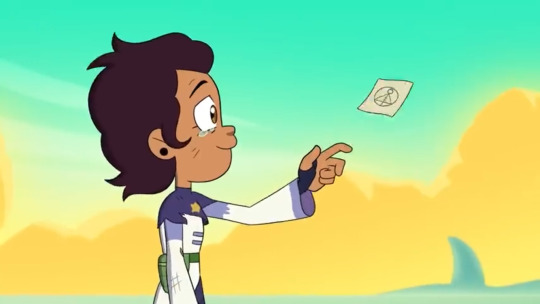
It’s a coming of age moment appreciating what was given by a paternal figure, with Dana now comfortable exploring other beliefs and practices after making her farewell with Christianity by realizing it isn’t absolute, yet still treasuring what it was able to give her. So she carries on what she can, at least in spirit, like… Luz and the glyphs, remembering them, and now having her own palisman to continue her love of magic that the Titan helped support. So we have both the narrative meaning to Luz behind all of this, and the real-life significance for Dana herself, which aren’t quite the same but there is overlap. And there’s also the other meaning for Dana in how the Titan represents her father, which we’ve already discussed.
So The Owl House and the storyline of the Titan could be Dana's own nuanced takeaway from Christianity; Her exploring how she feels about it, what she appreciates, what she doesn't, how it fits into the rest of her worldview. And I don’t think Dana is trying to convert anyone, nor condemn those who feel irreverent. I think she’s more about deconstructing Christianity to reconstruct it.
Be Gay, Do Witchcraft of course, I think there is a catharsis in exploring that. And also, because the sentiment behind that phrase might be less about Christianity being inherently evil, and more so that many queers don’t care what evangelicals think of them anymore; So sure, we’ll humor your fears for fun, we ARE the demons we’re accused of being. It’s like Eda saying “Well we ain’t!” in response to Belos’ claim that humans are inherently better. Plus demonized belief systems that aren’t Christianity deserve validity as well, hence the pagan influences being portrayed positively, with the narrative questioning the dismissal of certain ideas being ‘demonic’ or ‘savage’.
And of course, co-existence IS possible. And I find this important because it can be easy to just dismiss religion entirely in an edgy internet atheist type of way, but in the end one must reconcile that religion means a lot for a lot of people, many whom ARE chill and willing to co-exist; The narrative presents the spirituality of the Boiling Isles as something precious, for example. All belief systems are valid, not just these select few.
And maybe they don’t have to be mutually exclusive with queerness or “alternative” lifestyles, because a lot of people from these demographics aren’t quite comfortable with just getting rid of religion entirely, and they’re entitled to still maintaining that connection. If feminists can still have a nuanced relationship with femininity, so can believers with their religion.
People are simply asking to be allowed to exist and practice their beliefs in peace, they aren’t really calling for the eradication of the other. Just as queers don’t actually intend to abolish heterosexuality, they just want to be left alone. Let people decide how they feel about certain things, instead of making them get rid of it for their own good; That is every individual’s personal choice, just as yours is. And that feels relevant, given how much Choice is a theme in this show, and especially in the finale in which Luz meets the Titan properly, with the Titan emphasizing this agency to her.
#If I’m right then this really resonates with me as a queer with a complicated relationship with Christianity where I’ve seen good and bad#the owl house#Dana Terrace#Christianity#boiling isles titan#analysis#meta#religion#speculation
73 notes
·
View notes
Text
Omertá prologue

Romeo Scorpius Lucci x reader
Preface: Just to clarify, the reader in this fic isn't the mc from tkdb.
The canon age of the characters isn't clear, so I've gone with around university age (early 20s).
Before you begin, I should probably warn you that if you're sympathetic to the Catholic Church as an institution, especially its allegations of corruption and attitudes towards queer people, this fic probably isn't for you, as I plan on including major criticisms of it in later chapters
Part 1
Napoli, 18 years earlier...
The full moon shined through the window and cast a dim glow in the dark corridor before you. Trying your hardest not to make a sound, you tip toed to the door on the other side of the corridor and pressed your ear against the wall. From the other side of the door, your father's voice rang out loudly as he discussed something about "shipments", "partnerships" and "profits," with two other men. At the time, you understood none of it, but your father's work had always been a source of intrigue to you, like forbidden fruit. Even though you were young, you'd noticed how everyone tensed up as soon as it was brought up, and you didn't really understand why. According to your mother, it was dangerous and it didn't concern you, but curiosity always got the better of you in the end...
You'd always been taught to keep to yourself and be quiet, especially when your father was conducting business in his private study. According to Nonna, that was serious grown up stuff that your brothers would become in charge of when they grew up, so it would never concern you in the slightest. Whenever she'd say that, you'd ask her what your job in the family would be, and she'd tell you it was to "support". She never told you what you would be supporting exactly - she usually lost her patience with you before the conversation went that far - but if there was one thing you could remember about your childhood was having a lot of questions and very few answers.
There was muffled laughter and the clink of wine glasses coming on the other side of the door. Maybe your father was hosting a party ? It wouldn't be the first time, but parties were normally earlier in the day and required a lot of preparation. They were quite boring, really... you'd only be allowed to eat a plate of food before being dismissed along with your younger brothers while the adults "discussed business".
"Y/N ? What are you doing still awake ?"
Suddenly, you heard the door unlock with a metallic click. Your father came out with a smug grin, his business associates trailing in his wake. His eyes widened, and he frowned slightly as soon as he saw you.
Before you could reply, your father kept talking.
"It doesn't matter. You're lucky I'm in a good mood. I'll finish things up with Mr Lucci here and then I'll accompany you back to bed,"
Mr Lucci ... you'd heard the name before several times. He belonged to another very influential family in the city, and, underneath his fashion brand, he had a very different business going on. Recently, he'd done a lot of business with your father, whatever that meant. If you remembered correctly, he also had a son around your age who you'd seen at functions a few times.
Your father turned back to Mr Lucci.
"I look forward to working with you. May our partnership be mutually beneficial for both our families,"
Mr Lucci gave him a nod and shook his hand, cigarette hanging out of his mouth.
"I'm certain it will be. I'll be heading off then, Mr L/N. I wouldn't want to intrude on your family any further,"
Your father smiled at him, and something about it sent chills down your spine, before leading him out of the corridor and to the front door across the living room.
"Nonsense, my associates are practically family. We take care of each other,"
Mr Lucci met your father's smile with an equally unsettling one before nodding in agreement and walking out of the door to the parked Lamborghini waiting in front of your house. The windows were blacked out.
As soon as Mr Lucci left, your father walked up to you and took your hand in his own, the smile that had been previously disfiguring his face replaced with an almost tender expression.
"I'll let your snooping around slide for tonight, but don't make a habit of this, Y/N, or there will be consequences. Let's get to bed now,"
Masterlist
#tokyo debunker#tokyo debunker fanfiction#tokyo debunker x reader#tokyo debunker romeo#romeo lucci#tokyo debunker romeo lucci#tkdb#tdb x reader#romeo scorpius lucci#romeo lucci x reader#romeo x reader tdb
27 notes
·
View notes
Note
Weird question if you don’t wanna answer since you’re not a fan of Eddie currently totally ok!
It was mentioned that an original idea was Eddie and Tommy as a couple (I’m assuming this is what the plan was if they could get Natalias actress back), personally with such a short season (7) I don’t think they could’ve executed it as well, but hypothetically if season 7 was a normal length do you think they could’ve made a good couple?
I think the arc wouldn’t have been as happy and easy going as BT, but honestly think it would have been really entertaining.
okay for the sake of this, we're going to put all technicalities (actors, writers, production etc) out of mind and act like we're discussing real people for a minute, because the answer otherwise is just "the storyline got dropped so it doesn't matter". I'm also going to try and be neutral, but this will be a critical answer, because well, it's me.
Honestly, I think they would have maybe gone on a couple of dates before realising that they're just not well matched romantically.
Tommy would have enjoyed doting on him, and spending time with Chris. But I think their expectations for a relationship would have been too different to overcome. Eddie is still very much trapped with the toxic masculinity ideal of relationships, which is that his partner is there to support him, but that he doesn't really need to do much to support them. Tommy, however, is a 40+ year old man who has learned well enough that relationships need balance in order to work.
I think their first date would have gone just as badly as Buck's did, if not worse. Eddie doesn't handle judgement very well, and where Buck tends to fawn, Eddie's reaction is to fight. I think Tommy would have cut the date short, and Eddie would have sought to regain Tommy's attention/trust/affection in the same manner that he does with Buck - push Chris at the problem, make a few jokes, brush it under the rug.
Now, this isn't to say that I think Tommy would be an innocent sufferer/victim in this scenario. I don't think he would tolerate this behaviour, even if he really liked Eddie. I think this would have led to a confrontation between the two of them, with Tommy being firm on his boundaries even if it means screwing up something that has the potential to be really good.
I think they would probably be compatible sexually, at first. Eddie still has a lot of that toxic masculinity to unlearn, though, so I think the idea of bottoming would probably freak him out. There would also be Eddie's religiosity to confront, as well, since traditional Catholicism isn't exactly queer-friendly, and we've already seen Eddie struggling with his Catholic guilt.
All in all, the answer would be no. I don't think they would be a good couple. I do however think that they probably would have come to a fairly amicable "friends with benefits" arrangement in the end, because at least the sex is good.
8 notes
·
View notes
Text
Michelangelo Signorile at The Signorile Report:
On LGBTQ rights, Pope Francis, who died on Monday at 88, was a paradox. It’s often forgotten that, before he became pope in 2013, as Cardinal Jorge Mario Bergoglio in Argentina, he’d often fought LGBTQ rights and made horrifically homophobic comments. Many LGBTQ people in a country that was out front on marriage equality condemned those comments, even as some Argentine gay activists said he quietly supported them.
When he became pope, Francis quickly began offering gay-friendly rhetoric, challenging conservatives in the church. This was decidedly not what those who elected him expected. The majority of cardinals—those cardinals under 80 who elect a new pope—had by then been appointed by Pope Benedict before he retired. They were men very much in Benedict’s own image, pushing a right-wing, antigay ideology.
So, was Francis, as a cardinal, a stealth progressive on the issue, who said and did what he had to do in order to get into the pinnacle of power in the church, even if that meant promoting ugly bigotry in the short term? Or did he experience a transformation, evolving as he became pope, but also understanding the pro-LGBTQ politics of the West, which is where most of the money is, something the Vatican, as a financial institution besides being a political and spiritual one, couldn’t ignore? It’s probably a mix of both, which also helps to explain the backsliding Francis sometimes engaged in, often angering his most ardent supporters. There’s no question that, with his death, the world lost a religious leader and head of state who used his enormous platform to speak up for environmental protections, the rights of immigrants, and aiding the poor. Having been arrested many years ago while protesting the previous pope—back when he was Cardinal Josef Ratzinger, head of the Vatican’s horribly antigay Congregation for the Doctrine of the Faith—I’ve always been a harsh critic of the church and its historic homophobia.
But Francis, by 2020, had become a force for change for queer people too, even if he was at times inconsistent. I’ve written here in recent years about the impact he had in taking on the conservative American Catholic church on issues affecting LGBTQ people, and, by default, taking on the GOP and the extremists in its base. His urging parents of LGBTQ people to accept their children for “who they are,” his having met with transgender Catholics and his backing the “blessing” of gay unions—if not supporting marriage—were among many examples where he pushed the envelope. As a nation state with impact on the world, The Vatican has an outsized influence on governments on these and many other issues. While the church’s doctrine on sexuality wasn’t changed—the church is on the 500-year plan, as I always say—Francis put in place the people who could change church doctrine moving forward, certainly if a pope with his views is elected by the cardinals.
Francis’ booting of Cardinal Raymond Burke—a homophobe and Covid denier in the American church who worked with anti-gay Republicans and supported Donald Trump—as well as the sidelining of quite a few other bigots in the church while replacing them with more enlightened cardinals who supported LGBTQ rights helped to cement his legacy. And he put in place the vast majority of cardinals who will now vote for his replacement. [...] And yet, Francis sometimes backtracked on his views when he got pushback from conservatives in the church that garnered media attention. The press would be sent many ambiguous statements from the Vatican about what Francis actually said about homosexuality or gay rights or transgender people after something was leaked that seemed to push boundaries. He was doing a political balancing act, even as many don’t want to believe the pope, besides being a spiritual leader, also tried to be a pragmatic politician. Francis often seemed to move two steps forward, and then go one step back. Even though he supported blessing gay unions, for example—a big two-step—Francis in 2023 approved a Vatican document that stated people in same-sex relationships couldn’t be godparents. But the same document stated transgender people could be godparents and could be baptized. Yet, Francis, in 2024, lashed out at what he called “gender ideology” as the “ugliest danger of our time.” Also last year, Francis was reported to have used an Italian anti-gay slur in describing gay men—frociaggine—at a closed door meeting in which he reportedly spoke against allowing openly gay men in the seminary. Then he issued an apology for using the slur—something you rarely get from leaders these days—but then it was reported he used it again two weeks later.
The late Pope Francis made some moves to make the Catholic Church more accepting of LGBTQ+ (and trans people), but he also had moments where he did anti-LGBTQ+ and anti-trans things.
See Also:
Charlotte's Web Thoughts (Charlotte Clymer): Who Am I to Judge Him?
The Advocate: Pope Francis's LGBTQ+ record: the good and the bad
9 notes
·
View notes
Note
The Devil's Dear Friend - A What if?
Alastor's connection to Lucifer was overwritten when he tried to save his mother from her employer and was killed first. He ended up in heaven for his sacrifice.
Nicaise was not granted the same reward. One moment she was screaming and holding her son, the next she was alone and staring up at a blood red sky.
A century later, Charlie hears a knock on her door and opens it to find a fierce overlord literally marked by grief and wearing a bright smile. "Hello Princess! I heard you're looking to make some changes around here?"
I was about to start with how hypocritical that would be of Heaven, since the whole reason Nicaise even got in that altercation with her employer is because she was trying to protect Alastor in the first place. Then I remembered; Heaven's leadership is hypocritical, and even they don't know what the requirements to get in are.
I've always depicted Nicaise as a friendly and sweet person, but most of my posts about her take place after she'd been living in Heaven for almost a century. While she is a shrewd person who was suspicious of Heaven's leadership and knew there was something not quite right, she still lived in relative safety and comfort for a long period of time and could afford to relax her guard. On Earth she had it quite a bit harder as a woman of color as well as a single mother. Especially in the early 1900s. I imagine Nicaise as someone who actively chose to take joy wherever she could, but also a grounded person who did what she had to to make sure she and Alastor were okay. Nicaise took great pains to never let Alastor see her struggle and give the impression she always had every situation under control.
Gee, sounds familiar, don't it?
She built herself a strong support network, making as many friends as she could. During the day she cleaned wealthy people's homes and at night she played piano at the bar, to put food on the table. She made connections in both places, with other servants, with the bar staff and patrons, with shopkeepers and store owners, with just about anyone she could strike up a conversation with. She knew how to trade favors and get discounts and was able to build a relatively comfortable life even after her parents passed and she had no other family to help support her and Alastor.
In Hell, Nicaise again does what she needs to to survive. Even if that means making deals. I'm a little undecided on what sort of powers Nicaise would develop if any. In the main branch of the the Devil's Bastard AU I decided that the person Alastor made a deal with Eve, and that she specifically chose him because he is Lucifer's son. But Eve doesn't have any way of knowing about Nicaise mothering Lucifer's child in the Devil's Dear Friend so I don't have a reason for her to make a deal with Nicaise. She wouldn't manifest with overwhelming magical power like Alastor did, she would have to slowly build it up over time. Nicaise grew up Catholic because of her father, but her mother was vodou practitioner, so there could be some overlap in their abilities as Nicaise gets stronger.
So Nicaise forms connections, begins building a power base. Along the way she meets and befriends Rosie, and at some point or other sinners start looking to Nicaise for protection. Becoming an Overlord isn't something Nicaise set out to do, but she wields the title with pride. Sure, she's grown more ruthless over the years, more bloodthirsty, and sure, she hasn't thought about her son in... years now.
She did mourn at first. But these days she's, well, she's not exactly happy about it, but Nicaise is at least satisfied with the knowledge that Alastor is safe in Heaven. She has some criticisms but at least she knows her child isn't in any danger of being hunted down by an exorcist, or any of the more commonplace dangers of Hell. It's bittersweet, and she can't help but wonder why they had to take her away from her child, but on the day-to-day her main concern is with survival.
Eventually she does learn about the Royal Family and Princess Charlie Morningstar, but it isn't until Charlie's segment with Katie Killjoy that Nicaise actually gets an opportunity to meet her. Nicaise isn't sure what to make of the Happy Hotel project. She's not opposed to the idea that people could change for the better but, given she doesn't even know what she did to end up in Hell, she's not so certain Heaven would accept any damned souls even if they did. And as an Overlord, she knows full well how dangerous it is to show even a slight amount of weakness.
Still, she's intrigued. How could she not be? This girl is the Princess of Hell and she's trying to change one of the fundamental rules of How Things Work. Nicaise could get some answers. She could learn what she did that was so terrible that she was condemned to an eternity in Hell for it. She might even get a chance to see Alastor one last time.
If nothing else, there is an opportunity to get in good with the Princess of Hell, a powerful ally to be sure. Unlike most of the fools in Hell, she knows better than to dismiss Charlie's power just because she doesn't flaunt it.
At first she's not really counting on getting to meet Lucifer again just because she's made contact Charlie. After all, while Charlie was running around post-extermination rescuing survivors and treating their injuries, Lucifer remained holed up in isolation. Frankly, after her initial surprise that that little goofball she met at Mardi Gras years ago was Lucifer himself, she didn't think too much of him. He'd been out of reach to her for so long, and Nicaise preferred to focus on things within her scope of influence. When Charlie invites Lucifer to the Happy Hotel a month before the early extermination, Nicaise doesn't even expect him to recognize her.
He does. He very obviously does. Not only can she see it, so can everyone else with the way Lucifer stares at her, eyes wide, and says her name before being introduced.
Nicaise says the only thing she can think of to break the awkward atmosphere.
"Hello, Luci. I'm here for that child support you owe me."
#ask#anonymous#Hazbin Hotel#the Devil's Bastard AU#the Devil's Dear Friend AU#Alastor's Mother#Nicaise (Hazbin Hotel OC)#Lucifer Morningstar#I won't say Overlord Nicaise is necessarily 'nicer' than canon Alastor#just less overtly suspicious#because she's still very much impacted by her environment in Hell#I think she and Carmilla would get along alright
21 notes
·
View notes
Text
Germany's conservative new Chancellor Friedrich Merz has pledged to end months of political paralysis and rebuild Berlin's international standing, but got off to a bruising start on Tuesday.
Having vowed to hit the ground running, the 69-year-old instead stumbled when he lost an initial parliamentary vote to elevate him to the chancellor's office, a first in post-war German history.
After a long day of high political drama and a tense second vote in the Bundestag, Merz scraped through, visibly relieved to achieve his decades-old goal to lead Europe's top economy.
Merz will be hoping the episode was just a bump in the road as he sets out to build a "Germany we can be proud of again", his motto in the campaign leading up to February's election.
He has vowed to reboot Germany's ailing economy, strengthen the threadbare armed forces and curb irregular immigration, signalling a rightward shift in the way the country is governed.
Six months since the collapse of ex-chancellor Olaf Scholz's government, Merz has also pledged to swiftly rebuild Berlin's role on the European and world stage.
But the first-round rejection by MPs dealt an early blow to Merz as he seeks to get to grips with myriad challenges facing Germany in a world upended by US President Donald Trump.
"Merz is now considered damaged, a chancellor without a stable alliance -- and his popularity ratings are already not good," judged news weekly Der Spiegel.
- Business background -
It was a humiliation for the former BlackRock board member, who has a strong business background but has never held a government leadership post.
Still, Merz has previously shown his will to overcome setbacks.
He made a political comeback after being sidelined from power in the early 2000s by long-time party rival Angela Merkel, who went on to rule for 16 years.
Merz has vowed a return to the old-school conservative roots of their Christian Democrats (CDU) and overturn much of her legacy, especially her open-door policy to migrants.
In a political gamble, he pushed a non-binding parliamentary motion demanding an immigration crackdown earlier this year with the support of the AfD -- a move widely condemned as breaking a long-standing taboo against co-operating with the far right.
Merz has also vowed a "zero tolerance" law-and-order drive and to limit "woke" policies.
- Hobby pilot -
A millionaire and amateur pilot who owns a private jet, Merz has faced criticism for being aloof and out of touch.
He sought to soften his image on the campaign trail, sometimes showing up with a beer in hand at campaign events.
His approach paid off and his CDU/CSU alliance went on to come first in the February elections. To win a majority, it then forged a coalition government with the centre-left SPD.
But he shocked many Germans by swiftly moving to push changes to the "debt brake", which limits how much the government can borrow, laying the ground for vast extra outlays in defence and infrastructure.
During the election campaign, Merz had pledged not to touch the debt rules, and the move him an easy target for criticism from the AfD, which came second in the February election.
Merz, a Catholic, lives among the hills and forests of the Sauerland region of North Rhine-Westphalia state.
At 198 centimetres (six foot six), Merz stands out in a crowd.
He has been married for more than 40 years to Charlotte Merz, a judge, with whom he has three adult children.
A trained lawyer, he was elected to the European Parliament in 1989 and soon after to the Bundestag, where his mentor was the late CDU powerbroker Wolfgang Schaeuble.
When he lost the internal battle against Merkel, Merz took a break from politics and went into the business world, serving on multiple corporate boards.
A free-market liberal who wants to slash red tape to help Germany Inc, he outlined his views in a 2008 book titled "Dare More Capitalism".
Merz has sought to turn his long stint in the business world into a key selling point, said political scientist Antonios Souris of Berlin's Free University.
"He likes to flirt a little with this role of having returned to politics as an outsider, as an experienced captain of industry, not just a career politician like Scholz," he said.
3 notes
·
View notes
Note
Hi! Sorry if im bothering you again but i wanted to ask you two questions ,if you dont mind
1)What are your thoughts on Alys Rivers?
2)Since you see have watched the Tudors ,what are your overall thoughts about the show?
Anyway ,have a good day!
Hi! Sorry for taking so long!
1. Alys Rivers was made to contradict Aemond and his hate for bastards. I haven't read the books and I do not intend to, I do not know what the book says about her, so I follow what people have said about her only, she is a bastard, she's a witch, and I kind of feel like she will have this change of sides. I'm actually excited to see how her relationship with Aemond will progress, but I also want to know her personality, like she doesn't strike me as a badass witch (but I can be wrong), only this beautiful seer that maybe is kind enough, I mean, why Aemond would order to kill a bunch of people and let her alive? What did she said? How did she act? Aemond is very polite and is very well educated, what does this woman have/did that was different? So I don't believe she have a """""""great (strong, femme fatale) personality""""" otherwise she would clash with him. But this completely based on the voices in my head I feel like we will have a very different Alys Rivers. To support my claim, there is also the fact that he stated that he wouldn't mind marrying Helaena, while Aegon was complaining about it, so Alys could kind of fit in this type, which I don't look forward to, but again, only my speculations.
2. The tudors have a special place in my heart no matter how badly it represented the people of that time. I was in a very great six wives obsession at the time, so along with the show I watched lots of documentaries and read a lot of historical takes and opinions about that time period, so I never let the show and critical part mix. However, I believe they did a good job in representing some key events of the time, like Henry's despair over what he did to Anne, his feelings about Mary and Elizabeth, the change in character he had when he suffered the accident, that also happened in real life, how he must have felt when Jane died and like he got rid of three wives some way and it must have gotten to him.
Jonathan Rhys Meyers is hot, Henry VIII was described as hot when he was younger because he was like athletic, redheaded viking and taller than most men so ambassadors were like 👁👄👁 about him, and he was perfect catholic Prince, he was Aragon and Castella son-in-law, and they captured this glorious beginning and his ups and downs till the end of his life.
Let's not talk about the clothes, even though I love it, I wish it was more accurate.
I really like also how they portrayed his love story with Anne, because we have his surviving letters to her and he would do teenager things like draw their first name initial letters together with arabesques and hearts, he redecorated his palace to have tiles and figures of this drawings, hearts and symbols to represent both of them, he move heaven and earth for her, and it was shown in the show. Though real life Anne was apparently more reluctant at the beginning, and more daring and witty when he couldn't get rid of Catherine. They had a deep love story and after that he wasn't as passionate and not as engaged in his relationship as he was with her, or not as devoted as he was about Jane who gave him his heir.
So overall is a good show, and I watched many times to kill time when I could. If you haven't watched, I believe it's worth it give it a try!
7 notes
·
View notes
Text
Famous Inventor’s Icks.
Henry Ford
Apparently, he hated Jews. He even made an entire newspaper section dedicated to telling the public just how much they're trying to achieve world domination continuously for a good number of years, on the front page, called “The International Jew: The World's Problem,” even Hitler was hyper aware of his works and praised them, soon even awarding Ford the Grand Cross of the German Eagle on his 75th birthday, 30 July 1938. Which he accepted since you know, they were far away buddies.
Thomas Edison
He hated tons like an elephant weight number of tons. 1 – Any form of criticism, got extremely annoyed when Henry Morton, the President of the Stevens Institute of Technology, called his light bulb a "conspicuous failure" in a public letter. 2 – Most (if not all) black inventors getting any kind of credit for things he majored in like, Edison sued Granville T. Woods, a prolific Black inventor, twice in the 1880s, claiming that he invented the telegraph for trains first. 3 – Tesla. Tesla eventually resigned from Edison's company after becoming convinced that Edison hadn't lived up to a promise of bonuses.
Madame Curie
Xenophobia, Curie faced xenophobia as part of the right-wing press campaign against her. Sexism was also an obvious and huge problem for her as well, some of her coworkers didn’t enjoy her much because they felt she was spending too much time in the lab rather than with her own children. In 1911, Curie was denied a seat in the French Academy of Sciences, likely due to sexism and religion. The right-wing press spread false rumors about her, including that she was Jewish and not truly French.
Nikola Tesla
He absolutely despised germs, this man was the definition of a germaphobe to the point where he declined to shake hands, even wore gloves to avoid germs and hair, just simply hated the feeling of touching hair, some speculate that his hate of feeling hair is stemming from a childhood illness, made him particularly sensitive to the idea of hair carrying bacteria.
Benjamin Franklin
Hated Germans, even saying that they weren’t “as smart as the people already living in the colonies.” As of 1750s, disparaging "low women," Catholics, and Jews; decrying "alien" German immigrants who would "swarm into our settlements;" and labeling Native Americans as "drunken "savages who delight in war. take pride in murder," and should be pursued with "large, strong, and fierce dogs." Yet, in the 1760s, when white Americans attacked an Indian settlement, he labeled the attack "white savagery." African Americans, he described as "sullen, malicious, revengeful" and "by nature [thieves.]" Yet, ever the inquiring scientist, he visited a school for black children, emerging from the visit with a "higher opinion of the black race than I had ever before entertained."
Hedy Lamarr
Lamarr was not a supporter of her husband's political views and hated fascism. She was concerned about the war and didn't feel comfortable making money in Hollywood while the world was in such a state, Lamarr was unhappy in her marriage to Mandl, a wealthy armaments producer for the Nazis. She described him as controlling and said he prevented her from pursuing her acting career. Lamarr escaped to Paris in 1937 and divorced Mandl.
Steve Jobs
Jobs famously disliked styluses, saying, "You have to get 'em, put 'em away, you lose 'em. Yuck! Nobody wants a stylus. So, let's not use a stylus". He also killed the Newton, a tablet-like device that used a stylus, also didn’t like Bill Gates very much, Jobs called Gates "unimaginative" and said that Gates was more comfortable in philanthropy than technology.
All information from google, I tried not to use Wikis, but if it’s incorrect then blame the internet, not me.
#steve jobs#inventory#hedy lamarr#benjamin franklin#nikola tesla#madame curie#thomas edison#henry ford#icks
6 notes
·
View notes
Text
I know there is a lot to say about the Catholic Church but what exactly was the point of this display of exhibitionism?
An active member of the Sisters of Perpetual Indulgence, a group of predominantly gay men who openly mock Catholics, was arrested in California last month for indecent exposure after witnesses say he masturbated in public for an hour, according to a sheriff’s office report obtained by The Daily Wire.
The man, 53-year-old Clinton Monroe Ellis-Gilmore, was arrested by police at a beachside park after they received a report of a male “exposing himself in the driver’s seat of a parked vehicle,” the Humboldt County Sheriff’s department said.
“According to numerous witnesses, Ellis-Gilmore had been at that location for approximately one hour, sitting in his truck with the door open, masturbating,” according to a sheriff’s report on the incident, which took place on August 12 at around 6:41 p.m. “The conduct does not appear to have been directed at anyone in particular.”
The arrest took place at Table Bluff County Park in Loleta, California, with over an hour of daylight still left. Google lists the park as “good for kids” and home to “kid-friendly hikes.”
A mugshot obtained by The Daily Wire from Ellis-Gilmore’s booking indicates that he was at least shirtless at the time of the arrest. The Eureka Sisters of Perpetual Indulgence did not respond to a request for comment on Ellis-Gilmore.
The Sisters of Perpetual Indulgence made headlines earlier this year after the Los Angeles Dodgers decided to honor the group at a “Pride” event. The group makes fun of Christianity and its members are men in traditional nun clothing that frequently use sexually suggestive names. It won the support, however, of many in the media, which defended the group from critics who said it was a perverted hate group and celebrated it for its “dedication to community service.”
Ellis-Gilmore’s initial arrest was only reported by a local Humboldt County website, The Lost Coast Populist, which located many of his old social media posts and first linked Ellis-Gilmore to the Sisters of Perpetual Indulgence.
Randy Fleek, a witness who spoke with the arresting deputies, told The Daily Wire that Ellis-Gilmore made no attempt to hide what was going on. He said that Ellis-Gilmore parked two spots away from his trailer and had his left leg out the open door of the truck and right leg up on the dashboard with no pants on, which gave him full side view of Ellis-Gilmore “playing with himself.”
“Well this is f***ed up,” Fleek said of what he saw. “It’s obvious. You cannot help but see this guy, he’s not hiding it. He wants everyone to see what he’s doing.”
He added that cars came and went throughout the hour, including some with young women. He also said that Ellis-Gilmore had his shirt on at the beginning but was naked by the end. He said he was happy when the sheriff deputies arrived, took him out of the truck, and got him dressed.
“There’s something wrong with that man. He’s got a weird f***ing desire to show off to the public, to anybody that wants to look at him,” Fleek said. “He puts himself in a position and in a spot that you can’t help but look at the son of a b***.”
He described the location as “popular” and one where a lot of vehicles come through to look at the ocean which he said made what he witnessed more disturbing. “People pull in to see the ocean, they don’t pull in to see this. But you can’t help but see,” he said of Ellis-Gilmore’s alleged actions.
Ellis-Gilmore, the alleged public masturbater, has been active in the local Eureka, California, chapter of the Sisters of Perpetual Indulgence for years. Ellis-Gilmore appears to go by several names in the group, including “Novice Sister Bethe Cockhim,” and “Novice Sister Man Romeo,” according to social media posts.
Pictures on social media place him at numerous events with his husband, Bill Gilmore, who goes by “Saint Gives More” — “Sainthood” in the group is bestowed on only the most dedicated community members.
Among the Eureka Sisters of Perpetual Indulgence events that Ellis-Gilmore participated in was a book reading at an elementary school where a man wearing a mock-nun outfit and Ellis-Gilmore, wearing fake blond braids, a dress, and fishnet tights, read to children.
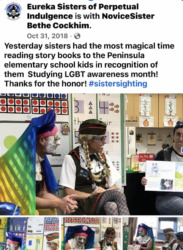
Facebook Screen shot.
“Yesterday sisters had the most magical time reading story books to the Peninsula elementary school kids in recognition of them Studying LGBT awareness month! Thanks for the honor!” a post from October 31, 2018 said.
The post tagged the Facebook account for “Novice Sister Bethe Cockhim,” an account that appears to be run by Ellis-Gilmore.
Prior to the event at the school, Ellis-Gilmore and his group had a history of sexually charged posts on social media. One post from the Sisters exhibited two members holding a plastic penis while posts from Ellis-Gilmore showed off his nipple piercing and a cartoon “gay” Smurf illustration that featured erections and pubic hair.
The event took place at Peninsula Union, a public elementary school in Humboldt County nearby where Ellis-Gilmore was arrested. The school did not respond to a request for comment on the Sisters, and whether it has hosted the group since.
Ellis-Gilmore’s social media is filled with Satanic and sexual themed posts, including one meme about oral sex featuring a pacifier, a lollipop, an ice cream bar, and a penis with the caption “Shhhhhhhh….it’s ok, you’ve been preparing for this your whole life.”
Another post features a faux certificate from the Sisters of Perpetual Indulgence that says “pleasure should be your god, lust your temple, and sex your sacrament” while another said “Be gay, hail Satan.”
Ellis-Gilmore was charged with indecent exposure, a misdemeanor on first offense, which according to California penal code can result in six months of prison time, a $1,000 fine, and a requirement to register as a sex offender.
#Sisters of Perpetual Indulgence#USA#California#Loleta#An alleged public masturbater once read to children?
7 notes
·
View notes
Text
"...it is not surprising that a group of [political] Catholic youth would focus on the anti-religious content of the UO [Université ouvrière] message. But, as we have seen above, [dissident communist Albert] Saint-Martin’s opponents on the left frequently made the same point. The historian Andrée Lévesque has examined the surviving transcripts of lectures from the later years of the UO (starting in 1932) and comments:
Few dealt directly with communism, and a large number were anti-clerical harangues denouncing the power and wealth of the church or Roman Catholic dogmas such as the Immaculate Conception.
In a piece looking back at interwar Montreal, Communist Party secretary Stanley Ryerson was highly dismissive of Saint-Martin, describing him as an “anti-clerical socialist”:
French-Canadian communists in Montreal were critical of this anti-clerical trend. To Saint-Martin’s anti-religious diatribes (lectures on the ‘Immaculate Conception’ and the like), they counterposed proposals for united action in support of … the unemployed; to which Saint-Martin’s rejoinder was to advocate at most a Ghandi-like [sic] policy of passive resistance.”
Immediately after this criticism, however, Ryerson admitted that “even among the militant francophone radicals … the trace of an earlier ex-Catholic aversion to the robes noires remained.” He described riding as the passenger of the communist Roméo Duval, who startled him by suddenly swerving and speeding towards a priest who was crossing the street. The clergyman just barely leaped to safety. Shocked, Ryerson asked Duval why he had done that. The driver replied “off-handedly” that he always did it when he got the chance; he couldn’t help himself. Ryerson’s pairing of these anecdotes belies his assertion that orthodox communists always avoided the anticlerical extremes of the heretical Saint-Martin."
- Elliot Hanowski, Towards A Godless Dominion: Unbelief in Interwar Canada. Montreal & Kingston: McGill-Queen’s University Press, 2024. p. 181-182.
#montreal#université ouvrière#anticlericalism#histoire de québec#communists#communist party of canada#radical history#christianity in canada#history of irreligion#atheism#history of atheism#working class history#history of religion#academic quote#canadian history#working class atheism#towards a godless dominion#great depression in canada#interwar period#reading 2024
1 note
·
View note
Text
trans women are biologically female.
the human species, like many species, is not strongly sexually dimorphic. in 99% of contexts "male" and "female" designate social sex classes not gamete production. sociological data and community ethnography makes it clear trans women are female. the vast majority of sexual dimorphism in humans is behavioral or downstream of sex hormones. from lordosis to brain imaging results, from mammary tissue to propensity for postviral conditions, trans women are female.
the categories of biological sex are not innate givens. they were invented by aristotle, a misogynist tryhard who got famous bc one of his students was a world-class imperialist conqueror. based on his observation of breeding captive dogs. he thought women had a different number of teeth than men. the categories of biological sex spread through imperialism & colonialism, attaching themselves to extant patriarchies. hellenism, roman empire, european colonialism. catholics & protestants forced colonized societies to adopt this framework. it is effective for empires.
there is nothing biologically innate about this. it is a choice to impose a category of sex on body types, gamete production, genes, etc. because it is a social choice it is constantly perplexed by biological reality in which these traits are only loosely associated.
when someone's social sex class is decoupled from the anticipated gamete production, there is no reason for the law to regard the latter as primary except to attempt to shore up the institutional power of the former by expunging contradictory data. that's anti-science and bigoted. but the whole thing is founded on bigotry. the legal categories of sex do not serve a biological function, they serve to perpetuate patriarchy. GCs are like those unions that betray the workers' interests to solidify their own position in the factory. Gender Critical women are class traitors to womanhood. they fight to further perpetuate the legalized suffering and abuse of women. at every turn their policies end up opposing bodily autonomy and supporting patriarchy. Gender Critical men are simply another type of MRA.
they're in power now: the patriarchs. so what can we do? what we've always done. live our lives, fight for our lives, try to squeeze joy from stony misery. the truth is on our side, however little that's worth.
0 notes
Text
reread ch 32 - 34: crying over leah in all honesty

hey, dante carries around a bible too on his belt! I think all exorcists do - it's the actual source of their powers, right?
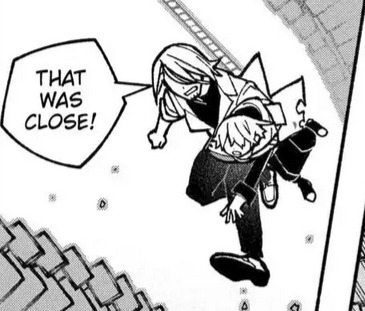
pick he up and carry under the arm hehe
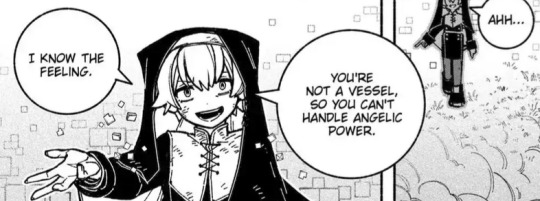
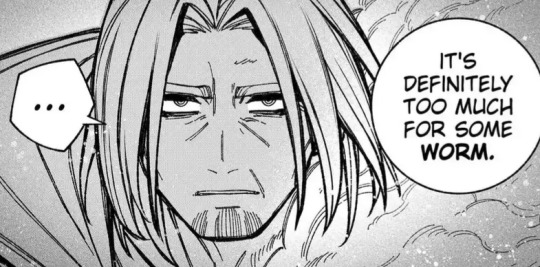
OHHHHHH. leah fighting back by belittling beelzebub and taking his power away....echoing rosa's words too
speaking of....
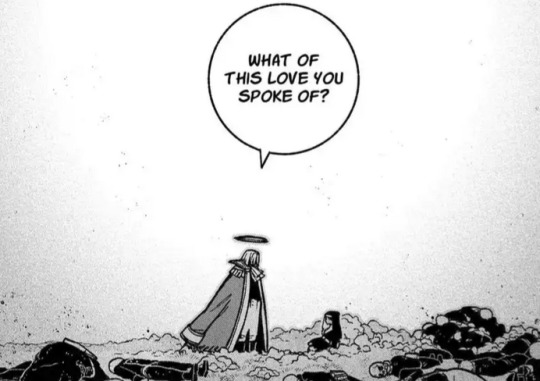
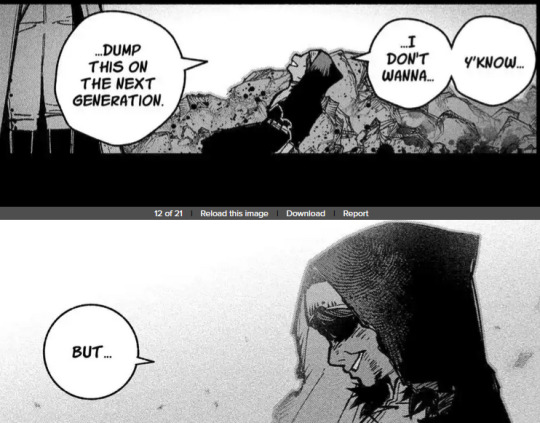
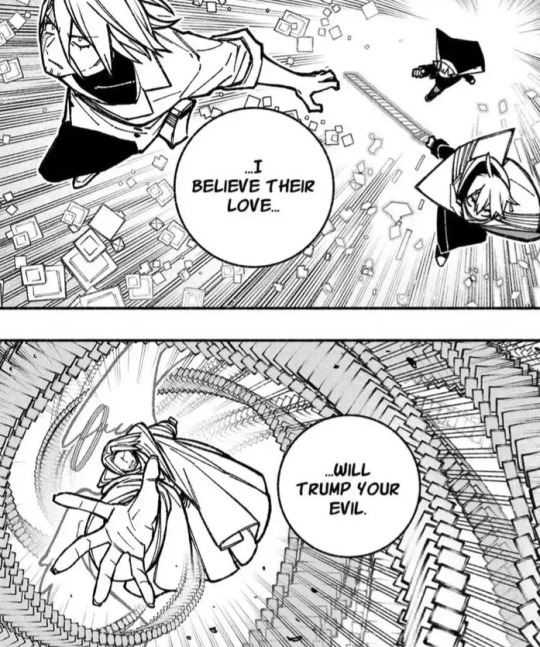
so it wasn't god's love that rosa was talking about, but the love of her fellow exorcists and students...it was HUMANITY...props to her for wanting to protect the next generation 😭 we lost a real one huh
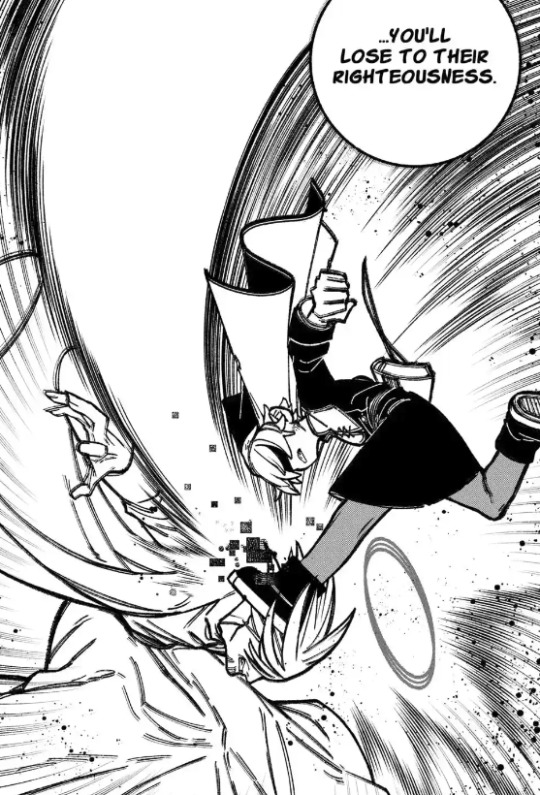
looking cool, leah!
even through the criticism of the church and the abuses of the clergy and the reactions of the victims, the story does still illustrate really well why people are committed to it and why they believe in it. it would be easily to believe that exorcists like rosa have faith in god, her fellow exorcists, and the church as an institution while criticizing the corruption and abuses of clergy as being aberrant and against the purpose of the system, and only needing to be removed for the church to be a force for good. many other clergy members have expressed such beliefs in calls and briefs. and I appreciate the nuance - you can really see why each person believes what they believe wrt a system that supports, covers up, and accommodates so much violence. ultimately some of these discussions eventually have to take into account the role of capitalism in poverty, but the catholic church as an institution is so culturally influential (and in many ways, insular) globally, that it's entirely possible to have a whole series dedicated to examining how it intersects socially with and perpetuates misogyny, homophobia, child abuse, csa, etc. without the real need for much examination for other social and cultural forces. and since this is an axction/romance manga and not a dissertation....good lol
and I'd like to think that mother rosa opposes corporal punishment for children - based on how dante viewed her, I think it's very likely - but we just don't know, do we?
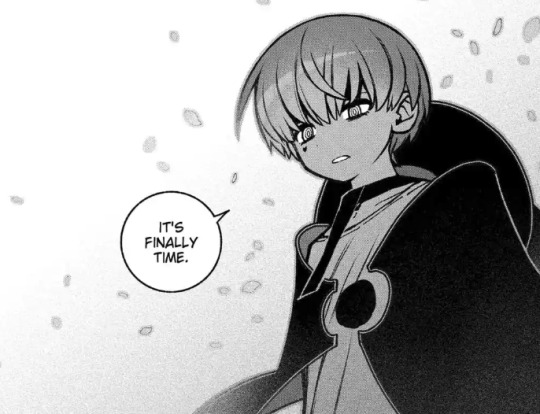
?????
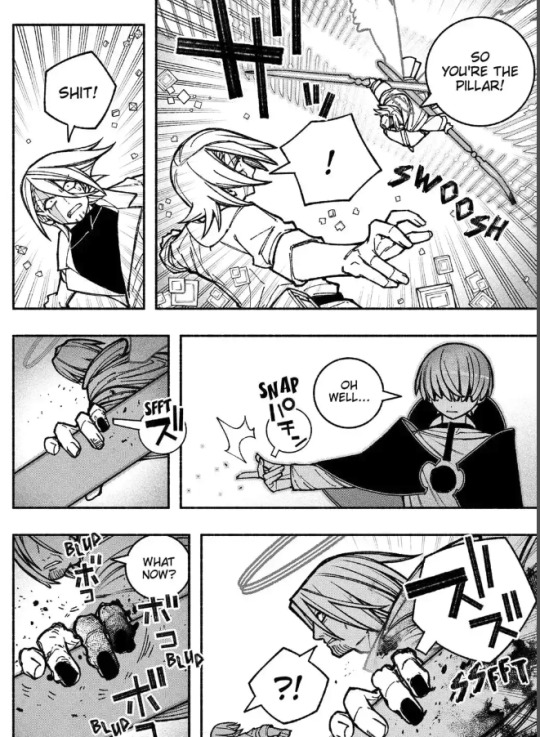
hello...verge gave beelzebub a fake finger and betrayed him to save dante's life? oho? so I think verge really isn't emotionally attached to beelzebub like tachibana is to mammon, he just wants to power for his own ends and he certainly won't let him kill dante
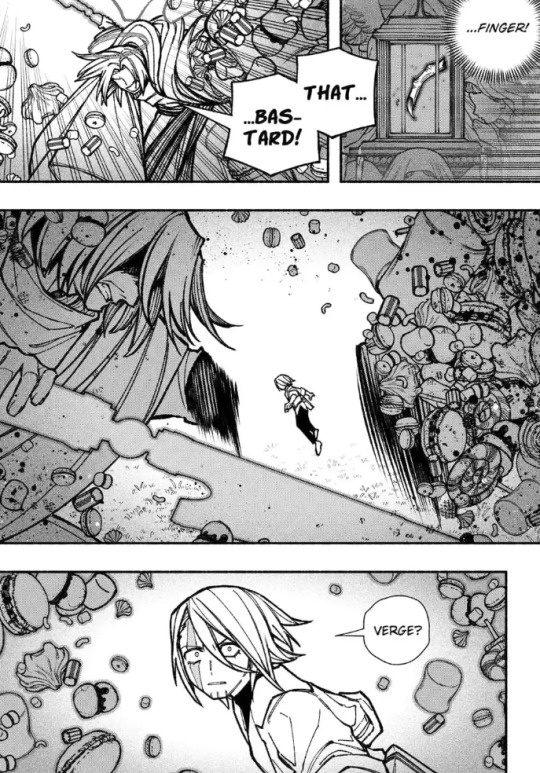
dante and beelzebub seeing all the candy...they know immediately who it is. and dante's face here...
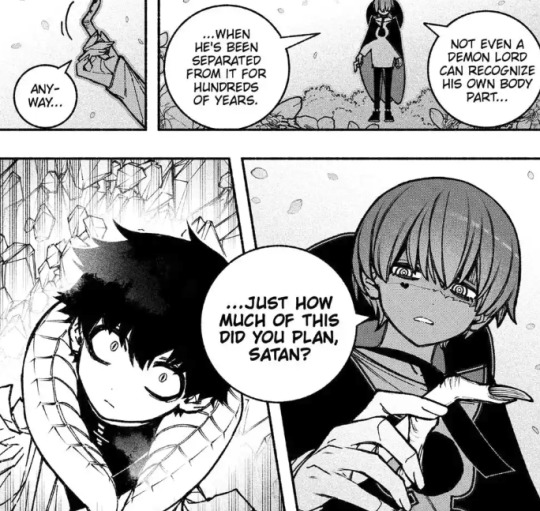
I was so confused by this but verge literally did all of this and is pinning it on satan so he won't be suspected, right? satan looks startled here, not smug or anything. he has no reason to sabotage beelzebub. did verge do this to just save dante? or does he have another reason to want to prevent this?
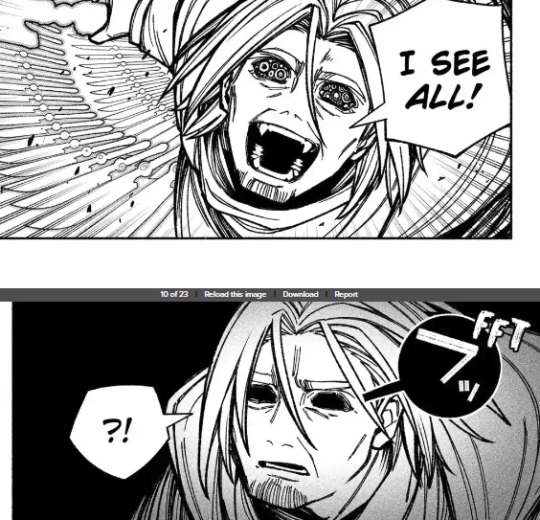
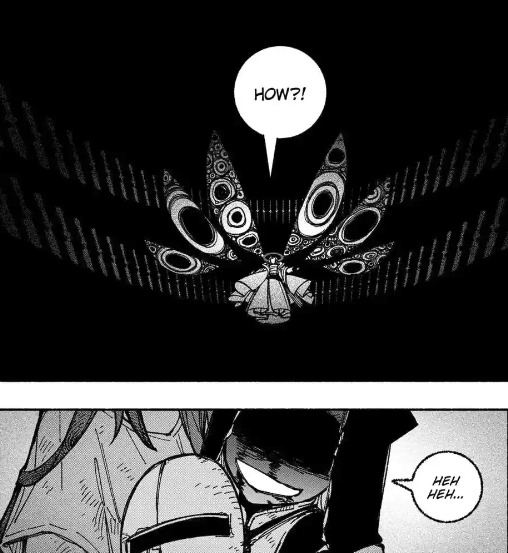
HEH HEH HEH....


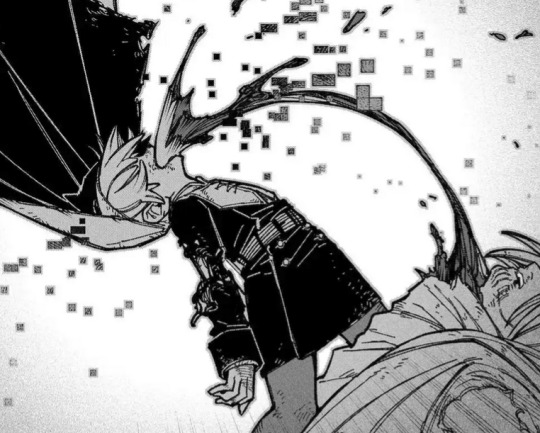
LEAH OFF THE SHITS
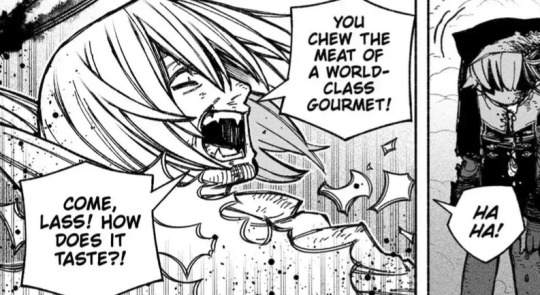
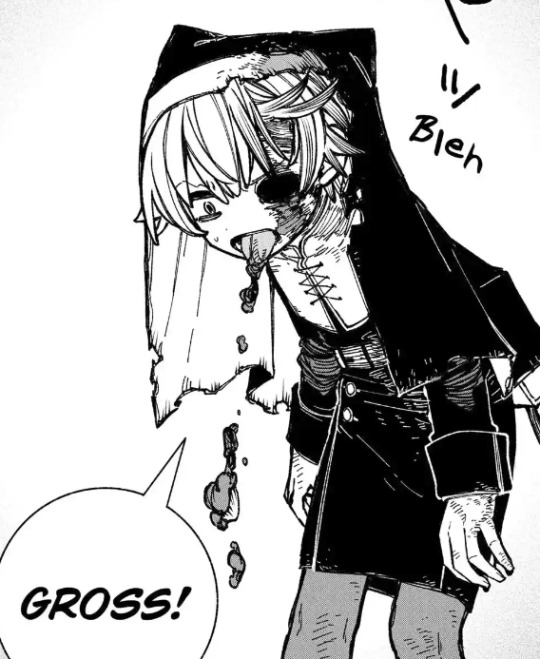
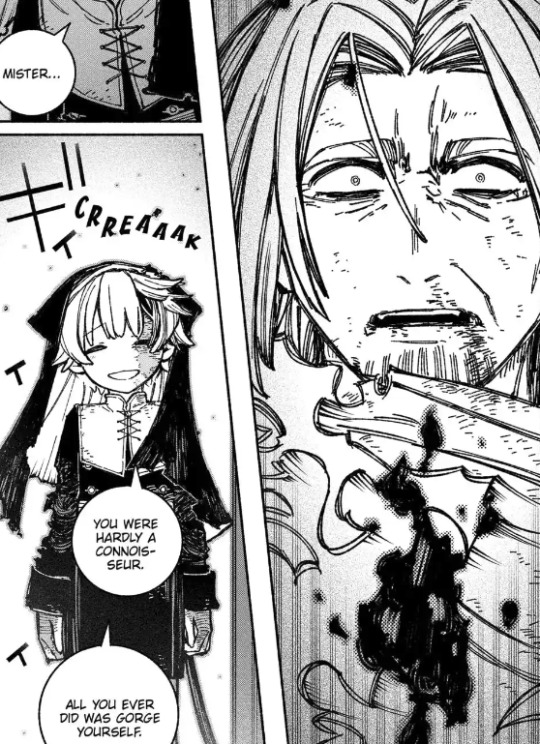
SHE WIPED THE SMILE OFF HIS FACE.....got back at him in a way that really hurt him. NICE


really apt visual metaphor for, haha, closure....

barbara promising not to get in the way of leah when he wants to throw her life away in revenge....it's a mark of respect for her determination and her choices, I think. even if...fuck, she's only 16, you know? It's always hard to see someone destroy themselves for revenge. but beelzebub is such a danger to the world that SOMEONE has to take him on. and barbara is right. she belongs to herself only. I can see why someone who's possibly faced violence from entitled men (speculation) and chosen to cover her face for life would respect another teenager girl's extreme choices in response to her own abuse. do you think barbara would support abortion? I actually think she would. I would like to know about her backstory....
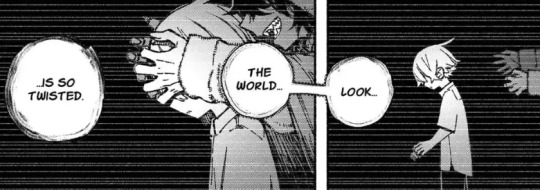
SCREAM he's right there. I was like 'huh who's that? oh I guess it doesn't matter' I was so dumb 😭
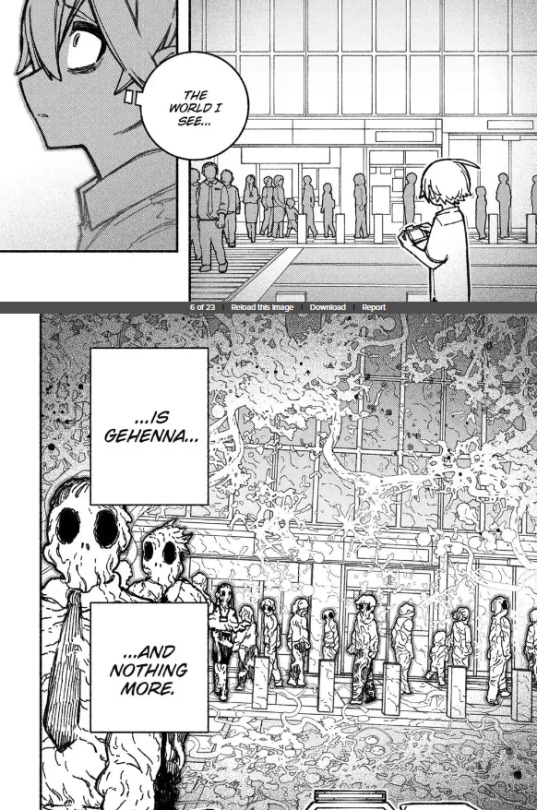
*through gritted teeth* IT'S A METAPHOR. I KNOW PRIEST CAN RECOGNIZE DIFFERENT PEOPLE
had no room for it but their pic together is so cute he's so awkward....

coming up and breathing for the first time in your whole life to see the vastness of the world and all the people in it and how they're all individuals with their own hearts and lives and their very existence enriches the world and your own life and you couldn't see it for so long because you were trapped in a hellscape of your creator's making...this panel is so lovely and dynamic. they're all just people having a nice day out!!!
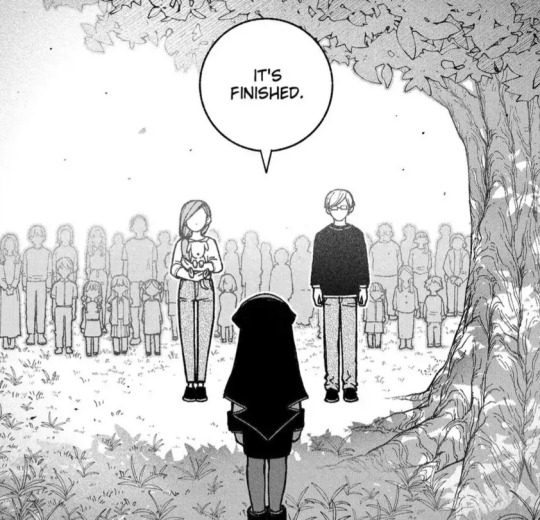
her family...her village...her dog....
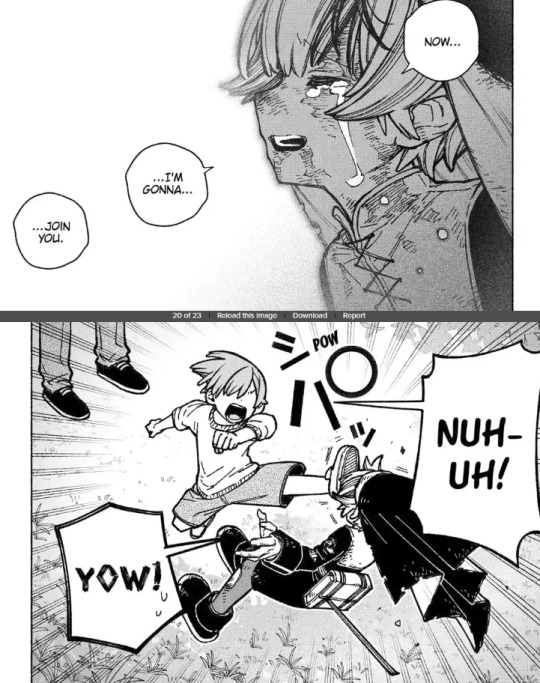
started cryingggg
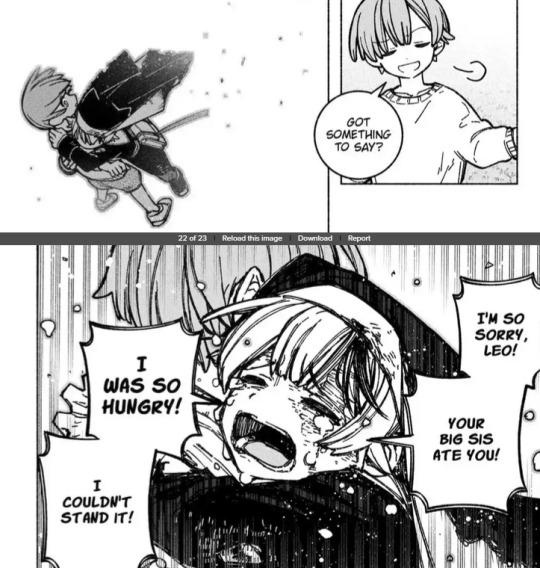
the blended humor and tenderness and horror in this panel is crazy

I am fully crying...he wanted to live too....
this chapter is titled HOLY COMMUNION - the 'Christian ceremony that involves sharing bread and wine to remember Jesus' death and resurrection'. during the eucharist, some catholics believe that bread and wine is metaphysically transformed into the actual flesh and blood of jesus. but it's not cannibalism - in this sense its holy, not the abuse and manipulation and child murder we saw beelzebub force leah into. I love that they invoke that here - the sacred mirror of the horrors she endured. because eating flesh, and killing animals, and enjoying food, isn't an evil thing. everyone needs to live
I also love that they drop the title at the end of each chapter. lets you ruminate on what it was about then see the title. more series should do this
the note of ch 34.5 mentioned miraculous healing after the battle - presumably the influence of beelzebub consuming the purified wing of asmodeus and hosting an angel, briefly bringing paradise close to earth
1 note
·
View note
Text
Eurovision 2007 - Number 19 - Simone Cristicchi - "Ti regalerò una rosa"
youtube
Another one from the third night of Sanremo with guests alongside the main artist. This is a jazzier version of the winning song this year, with Sergio Cammariere joining Simone Cristicchi on piano. Simone is in his first main Sanremo competition having competed in the Giovani section in 2006. He's had an ever impressing musical career to this point.
He got his start by performing on small stages in Rome. It was there that he came to the attention of other musicians such as Max Gazzè and Niccolò Fabi. As well as competing in several musical festivals, he supported them in their concerts. A record deal followed as well as an appearance on the 2003 show Destination Sanremo - a pre-Sanremo talent show to select that year's Giovani contenders. He didn't get to Sanremo that year.
He did eventually make it in 2006, placing as runner-up. For 2007 he got the invite to the main competition for the first time. He presented Ti regalerò una rosa (I'll Give You a Rose). It's a conversational song that includes some rapped/spoken word sections drawing on Simone's other performance skill of delivering theatrical monologues. It's a gentle and reflective piece for what is a devastating sad story.
Simone has always had an interest in mental health, asylums and hospitals having volunteered in one when he was younger. The song is a story drawn from the letters he found in the archives of the Volterra psychiatric hospital from various patients there. The subject, Antonio, is on the brink of suicide, but wants to be remembered by his love Margherita. It's poetry really rather than a song, but it's beautifully, written finding humanity in the darkest of places, the tragedy of forty years of heartbreak and isolation from the world.
Unsurprisingly it won. It also won the critics' award and the press award, and it went on to get to number three in the Italian charts and be a hit on the radio. Given the sadness and tragedy inherent in the song, that commercial success is perhaps more surprising than the win at Sanremo. It's even more surprising given Simone had two previous singles censored prior to 2007. One for using swearing to mock other pop music and one for a criticism of the Catholic Church. He had a reputation as an agitator. But he was also a very talented musician and performer.
Later in 2007, he published a book of his travels around Italy's mental health institutions and asylums, telling the stories of those incarcerated inside them. He later took part in two other Sanremo main competitions, 2010 and 2013, as well as guesting with other performers on two other occasions. He's released five studio albums since as well as performing at numerous festivals and supporting causes associated with mental health and prisons and those inside them. He's not someone to shy away from controversy even today.
This is a duet with Simona Molinari he performed on a TV show entitled Le poche cose che contano (The Few Things that Matter). It's a song called La Cura (The Cure) performed in the parish church at Romena.
youtube
#esc 2007#esc#eurovision#eurovision song contest#Helsinki#Helsinki 2007#Youtube#not a national final#Italy#Festival di Sanremo 2007#Sanremo#Simone Cristicchi#Sergio Cammariere
1 note
·
View note
Text
Take Me To Church
breaking down hozier's "take me to church"
My lover's got humor She's the giggle at a funeral Knows everybody's disapproval I should've worshiped her sooner If the Heavens ever did speak She's the last true mouthpiece
The first two lines of the song could be meant as the lover of the protagonist being a sweet person with a warm and carefree personality whom they met at the church(=funeral) — the church is compared to a funeral because of how grim and strict the church was.
The third and fourth lines speak of how the church of their love was against the norms of the church, hence the disapproval of others. Referencing the first and second line where the protagonist speaks of his lover warmly, it could also be interpreted as how his lover could bring joy and warmth of a religion compared to the cold church — the “I should’ve worshipped her sooner” line supports this interpretation, as he sees his lover as someone more worthy of worship and to follow than to the church’s cold and harsh norms.
His lover being the true mouthpiece, “mouthpiece” is defined as “one that conveys the opinions or sentiments of others”. If the Heavens ever did speak, it would be his lover that would convey all the divine messages of Heaven to humanity - he is equating his lover to that of an angel.
Every Sunday's getting more bleak A fresh poison each week "We were born sick", you heard them say it My church offers no absolutes
Every Sunday's getting more bleak with a fresh poison each week could be interpreted as the weekly sermon of the church and how they would spew such poisonous teachings to others — the teachings of the Christians and Catholics are not poisonous, but how those teachings are being used to antagonize anyone who has humane desires and the minorities, demanding only purity from humans is what we can say is poisonous.
“Born sick” is usually used against the minorities of the LGBTQIA+ communities, so it could be said that Hozier is criticizing the church’s way of condemning the queer community.
The church offering no absolutes could mean how contradicting the church’s belief practice was. Most churches praised the Lord and how His love could be the one to “save” the queer community, as one of the most popular misconceptions of queers is that they are hypersexual, filled to the brim with lust, which is one of the great sins. They preached of how God’s love can “save” the queer community and insisted on spreading “the love”, not realizing or even understanding that trying to “save” the queer community from what they call sin is an act of hatred towards other people’s sexuality, refusing to "love thy neighbor".
The church insists on how spreading the love of the Lord is what would “heal” the queer community, yet whenever they do this, they are not spreading love but instead was practicing a form of oppression towards the queer community.
This song is about a gay love that sparked within the harsh, cold community of a church that looks and brings down homosexuals and all the other things that are human.
Another interpretation of “we were born sick” could also be about how humans were conceived and born into sin - lust being one of them. This couple could be a highly sexual-driven couple and one of them or even both are ashamed of these “unholy” acts.
She tells me, "Worship in the bedroom" The only Heaven I'll be sent to Is when I'm alone with you I was born sick, but I love it Command me to be well A-, Amen, Amen, Amen
His lover is telling him to “worship in the bedroom”, which could be a piece of advice regarding the religious dilemma/trauma that the protagonist goes through as he tries to accept himself as a queer man. Instead of feeling guilty about being what they are, his lover suggests reclaiming their sexuality and accepting themselves and one of the first steps to do that together was to worship each other in the bedroom(=sex).
The “the only Heaven I’ll be sent to is when I’m alone with you” line proves that the previous advice worked for the protagonist. He feels the sex they have is truly divine and the love of his lover was enough for him to start worshipping them - a figure that is loving and full of passion, unlike the cold and suffocating church and its teachings.
The “I was born sick, but I love it” line speaks of how the protagonist is now accepting himself, using the words of the church and claiming to love the fact that he’s a queer man. “Command me to be well” was a request to his lover, whom he now worships - he feels so much love and passion that he was willing to do anything his lover wanted and all they had to do was to command him.
Take me to church I'll worship like a dog at the shrine of your lies I'll tell you my sins and you can sharpen your knife Offer me that deathless death Good God, let me give you my life
The chorus talks of how the protagonist, now accepting himself and learning more about his religious dilemmas, attends the church. He asks to be taken to church, perhaps a line to express his anger or bitterness at the fact that he had been following its teachings, worshipping in the shrine of lies(=church).
“I’ll tell you my sins and you can sharpen your knife” might meant that upon admitting his so-called “sins”, he was aware of the judgment that will follow after and hurt him. This was essentially how most conservative churches work where they will use the confessions (secrets) of others against you to become stronger, by using cleansing methods to erase “all evil”.
Deathless death could refer to two things; an eternal afterlife or what some may refer to as Heaven and love, but personally I think it refers to love more as Hozier once stated that “falling in love or being in love was a death, a death of everything”. Love is not a literal death, but in a way it could bring the death of self-hatred, loneliness, and much, much more. A deathless death.
🗣️ “A fundamental pledge made to you in church. After you pass away, they assure you of a paradise. But you won’t gain anything on the other end until you put in your living hours. And it’s a really bad bargain!” - Hozier, regarding the afterlife.
“Good God, let me give you my life” could be the protagonist’s pleas to his lover instead of the church — however, it could also be the protagonist is still willing to give and dedicate himself to his church despite knowing their shrine of lies and their wrong teachings.
If I'm a pagan of the good times My lover's the sunlight
He is choosing his lover as the object of his worship instead. The Pagans do not believe in the typical Christian God but instead believe in divinity within nature, the sun being one of them. Also, “pagans” has been used many times as an insult to someone who is considered “irreligious” or “hedonistic” by the church, so this could also be the protagonist using the church’s words and claiming that if having a good time is considered a sin, then his lover would be the center of his sin.
It also could be some sort of wordplay where the protagonist believes his lover is someone who sheds light on his dark, gloomy life where he has been hating himself for who he is. His lover is “the light of his life”.
To keep the Goddess on my side She demands a sacrifice Drain the whole sea Get something shiny
This one is pretty self-explanatory. To keep the “Goddess”, his lover, by his side, there need to be some sort of sacrifice. Pagan beliefs practice offerings instead of sacrifices and the protagonist compares that practice with being in love, where to keep the relationship happy and well, he needed to offer something.
Sometimes the things needed seemed impossible, like “draining the whole sea” and perhaps even accepting himself, which is something the protagonist had thought to be impossible before his lover came. But other times, a piece of simple jewelry could suffice (both in offerings and to his lover).
Something meaty for the main course That's a fine-looking high horse What you got in the stable? We've a lot of starving faithful That looks tasty That looks plenty This is hungry work
This one is pretty interesting to me because I see it as a bunch of wordplay.
“Something meaty for the main course” implies there’s a hunger that is felt and it craves something specific with full interest. Who feels a craving? Is it the protagonist? What does he crave?
The high horse here could be used to criticize the church and their belief of the queer community is full of sin and that the church’s way is the “true” path, placing themselves and their views on a pedestal and teaching and/or forcing others to do the same.
But as I’ve said before, this stanza is a bunch of wordplay in my eyes, so the fact that a “horse” is mentioned right after implying the want of something “meaty”(=interesting) could be strung together to insinuate there is a hunger or a want for something that is similar to the high pedestal the church has.
“What you got in the stable?” could be a way to ask "what sort of belief do you have?” as the previous line refers to the belief of the church as a “high horse”.
“We’ve a lot of starving faithful” feels like a callout to the people who do not yet have a belief — their minds still empty, a vessel yet to be filled by doctrines of the old. It could be Hozier’s way of saying people come to the church in pursuit of a belief that could satisfy them (I use the term 'satisfy' very loosely here). Upon finding what exactly is the practice that is being set, all sorts of comments began to pour in, such as “that looks tasty” and “that looks plenty”, which means the church’s beliefs and the way they practice it is something that satisfies themselves.
“This is hungry work” meant that the practice of the general church where they demonize and condemn minorities, specifically the queer community, was just a way to satisfy themselves — the feeling of being above others and hating on them was the work of people hungry for a sense of superiority. This also serves as some sort of warning about how not processing the teachings of the Bible could end up very bad to the point they’d go against the teachings themselves.
One with a mind who cannot process the teachings of a billion-year-old scripture is bound to be easily brainwashed by the church.
No masters or kings when the ritual begins There is no sweeter innocence than our gentle sin In the madness and soil of that sad earthly scene Only then I am human Only then I am clean Oh, oh, Amen, Amen, Amen
“When the ritual begins” could mean when sexual intercourse unfolds. There is no master or king in such a personal act — only people with equal footing who chose to love and worship each other, giving themselves to each other as proof. They do not think about social norms, the church, or God. They only think of each other.
“There is no sweeter innocence than our gentle sin” is my favorite line in the song. The gentle sin mentioned is referring to their sexuality or even their intercourse — the protagonist uses the word “sin”, a word that would always be present when you sit down to talk about homosexuality or fornication (at least, outside of marriage) in the perspective of a Christian or Catholic church was beautiful because no sin had ever been gentle. There is no sweeter innocence than their “gentle sin” because there’s no sweeter innocence to love someone of the same gender and to have sex to prove that. Both homosexuality nor sex is a sin — it is love and never has it been a sin to love someone.
“In the madness and soil of that sad earthly scene” refers to the madness he sees outside of the safe space he has with his lover — a cruel world and community they’re both a part of that hates them for who they are, something they were born with and cannot change about themselves.
“Only then I am human” is a wonderful line because all this time, the protagonist has been referring to himself as a dog. Perhaps he felt like one because of this loyalty he has to his church or their hard-to-get-rid-of principles or because society has been treating him like an animal just because he wasn’t straight. He feels like he could easily accept himself in the presence of his lover “when the ritual begins”, reclaiming his sexuality.
“Only then I am clean” is the protagonist’s way of saying the effects of the church’s teachings are still in his head and he thinks that he is still “dirty” of sin and he feels like the only way to feel cleansed was to be with his lover who he had said to be “a giggle at a funeral”. In a way, his lover sheds light on his life of religious dilemmas and helps him feel like he’s human, teaching him that there is nothing wrong with loving one another.
0 notes
Text
The overwhelming majority of New York voters blame President Biden for letting the migrant crisis spiral out of control, a new poll released Tuesday reveals.
The Siena College survey found that a stunning 84% of voters consider the influx of migrants a serious problem, with 57% identifying it as a “very” serious problem. Only 12% of respondents said the problem is not serious.
“It’s a sad case and Biden doesn’t even care. This is a federal problem and has always been a federal problem,” said Maria Ortiz, 37, works in retail and says she constantly sees migrants begging on the train with their babies.
“I’m not voting for him. I voted to get him in office and it’s [been] my biggest regret since,” she said at Jamaica Station in Queens.
Nearly two-thirds of voters — 64% — flunked the Biden administration’s handling of the migrant influx, while only 29% approved.
The poll suggests the crisis at the southern border that has swamped the Big Apple with the thousands of asylum seekers is dragging down Democrat Biden’s popularity even in blue-leaning New York.
“While other issues in Washington and abroad have largely driven the news cycle over the last few weeks, the influx of migrants to New York remains top of mind for voters, with 84% saying it’s a serious – 57% very serious – problem for the state,” said Siena College pollster Steve Greenberg said.
“Seldom do we see an issue where at least 79% of Democrats, Republicans, independents, men, women, upstaters, downstaters, Blacks, whites, Latinos, Catholics, Jews, and Protestants all agree – that the migrant influx is a serious problem.”
The survey indicates that even immigrant-friendly New York has reached the breaking point with the unrelenting crisis.
Nearly two-thirds of voters, 64%, say New Yorkers have done enough for new migrants and must now work to “slow the flow” of migrants from the border, compared to 29% who say the state should accept and work to assimilate them. That’s a higher figure than the 58% of voters who said so in August.
Mayor Eric Adams was roundly criticized for saying the migrant crisis would “destroy New York City” without aggressive federal intervention. But 58% of voters said they agreed with Adams’s statement, and the support of his dire claim was consistent from all regions of the state.
54% of voters said migration has been more of a burden, while just 32% said it’s a benefit, a worse figure than in the prior August poll.
Biden, 80, has trouble with his own base. A majority of New York Democratic voters — 52% — said they want a nominee other than Biden to be the party’s standard bearer for president. Only 41% of Democrats said they want him as the nominee for re-election.
Thomas Barnes, a 44-year-old transit mechanic, predicted a “huge red wave” in the 2024 contest.
“If this election goes any other way, I think it is time for the American citizens to take a good look at our election system.“
“Biden’s funding two proxy wars, Americans are not only broke, it’s getting worse — the crime rate is sky high. Law abiding citizens are afraid for their lives. I’m a transit worker, I see shit every night. Democratic policy is what got us to this point,” he said, while adding he also blamed Republican Texas Gov. Gregg Abbot for sending migrants to sanctuary cities.
“The working class is getting squeezed to nothing. We got nothing left. It’s our tax dollars, not the rich. I think Donald Trump has a really good shot [with] demographics that have historically voted Democrat — it’s all over social media. Black people are done with the Democrat party. It’s promise after promise during election season. Tons of pandering and no follow through. No delivery.”
His favorability and job approval ratings are underwater and he leads former Republican President Donald Trump — who is fighting four indictments — just 46% to 37% in a hypothetical matchup, with the rest of the voters undecided. His lead over Trump is shaved to 7 percentage points if Robert Kennedy Jr. and Cornel West run on minor party lines.
Republican Rep. Nicole Malliotakis, who has fought the opening of migrant shelters on her Staten Island turf, said, “New Yorkers overwhelmingly disapprove of Democrats’ open borders.
“From President Biden to Governor Hochul to Mayor Adams, they have created an unsustainable and unsafe crisis at the expense of their own citizens,” Malliotakis continued.
“Senators Schumer and Gillibrand should stop holding up our Border Security Act that passed the House in May and end this madness.”
Former Democratic Rep. Max Rose, who lost his seat to Malliotakis three years ago said the president “can’t ignore” the migrant issue.
“The Biden administration and Democrats have to show they can effectively and humanely manage the migrant issue or face serious election consequences,” said Rose.
“This could make the 2022 backlash over riots and crime look like a walk in the park,” he said.
Rose predicted Biden will carry New York in the presidential race next year because of the overwhelming Democratic vote in NYC. But Democratic candidates for Congress could lose if Biden fares poorly at the top of the ticket in the suburbs and upstate, he said.
In terms of popularity, 52% of voters said they had an unfavorable view of Biden compared to 45% who had a favorable view. Similarly, 51% of respondents disapproved of his job performance while 46% approved.
A staggering 65% of New Yorkers say the United States is going in the wrong direction under a Biden presidency, while just 25% said it’s on the right track with the remainder undecided.
Felix Ramos, a 26-year-old security worker, said if the polling trend continued, Biden would have to blame himself.
“New York might just become a red state, and that’s when you know you did a bad job as a president.”
Democrats outnumber Republicans by more than 2-1 and the last GOPer to carry New York in a presidential race was Ronald Reagan in 1984. But last year, Republican Lee Zeldin ran a competitive race for governor against Democratic Gov. Kathy Hochul and the GOP picked up congressional seats.
“And also true is that right now, Biden has his worst-ever New York favorability and job approval ratings,” said Siena’s Greenberg. “The good news for Biden is the election is more than a year away. The bad news is there’s more bad news,” Greenberg said.
“While 70% of Democrats view Biden favorably, and 70% of Democrats approve of the job he’s doing, 52% of Democrats say they want a different presidential nominee in 2024.”
Zeldin, for his part, said “President Biden should start preparing a concession speech” if the trend continued.
“If New York is close, you can only imagine where voters are heading in swing states,” the former Long Island congressman said.
“There is an intensified desire for a correction over disastrous one-party Democratic rule in New York.”
Only 30% of voters statewide approve of Adams’ handling of migrants’ issue while 46% disapprove. Even in New York City, 50% of Adams’ constituents disapproved while 41% approved.
Only 30% of voters statewide approve of Adams handling of migrants’ issue while 46% disapprove. Even in New York City, 50% of Adams’ constituents disapproved while 41% approved.
Only 37% of respondents statewide approve of Hochul’s handling of the migrant crisis, while 52% disapprove.
Public safety remains a major concern — 59% of voters statewide say crime has gotten worse over the past year, while just 9% said it’s gotten better and 28% said the same.
In New York City, 51% of voters said crime has gotten worse, while 33% said the same and just 12% better.
That’s a potential problem for Adams, who made bolstering public safety his top campaign pledge for City Hall in 2021.
The survey of 1,225 registered voters was conducted from Oct. 15-19, after the terrorist group’s Hamas invasion and slaughter of Israelis and Israel’s counter-offensive in Gaza. It has a margin of error of 3.4 percentage points.
The poll found that 57% of New Yorkers support providing more military and economic aid to Israel, compared to 32% opposed.
Meanwhile, 51% of responders back providing more military and economic aid to Ukraine while 38% were opposed.
“New York needs help and we have been asking for help but all [Biden] does is send help to other countries and lounge on the beach. Pathetic,” said Ortiz, the Queens straphanger.
On the Middle East war, 50% of voters agreed with the statement that Israel must do everything it can to get back the hostages taken by Hamas, but Israeli attacks in Gaza will largely hurt innocent Palestinian civilians more than anyone else
But 32% of voters agreed with the statement that after the surprise terrorist attacks Hamas carried out on Israeli civilians, Israel must do everything it can in the Gaza territory to make sure it never happens again, regardless of casualties.
8 notes
·
View notes